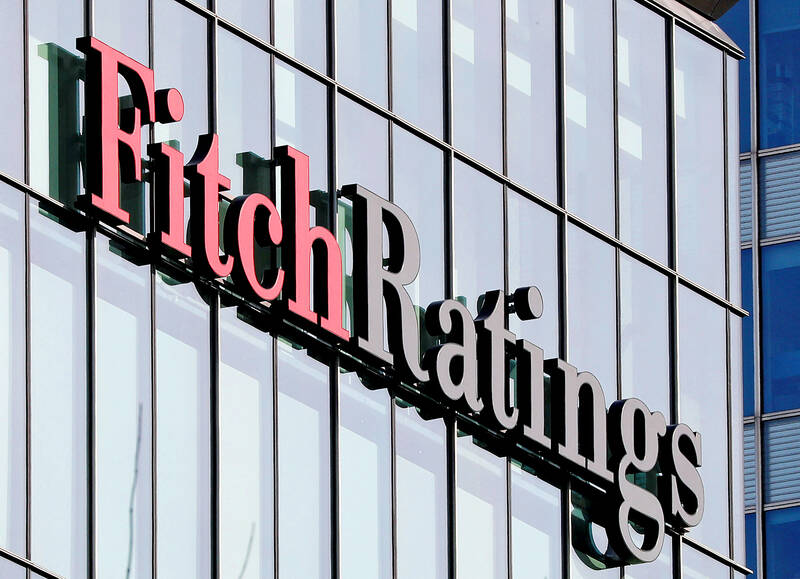Taiwan’s plan to implement the final Basel III reforms in January next year would have a very limited impact on local banks’ capitalization and asset growth, since no banks are using the Internal Rating-Based (IRB) approach in calculating credit risk, Fitch Ratings said in a report on Thursday.
The final Basel III reforms include revised credit risk approaches, a standardized operational risk approach, a credit valuation adjustment framework, leverage ratio revisions and an aggregate output floor.
“As such, the output floor under Basel III would have no impact on banks using the standardized approach for calculating credit risk,” the agency said, adding that it does not expect large deviations in the banks’ capital calculation given that Taiwan’s risk weights are conservative compared with peers.

Photo: Reuters
The new capital rules are to lower the average common equity Tier 1 ratio by less than 20 basis points, it said.
Fitch said it is looking at stable core profitability, solid profit retention and moderate growth in risk-weighted assets to sustain capitalization.
The banks in Taiwan are well-positioned to adopt the new capital rules, including the higher capital surcharge (minimum Tier ratio of 11.0 percent) for domestic systemically important banks (D-SIB) by the end of next year, it said.
Taiwan’s six DSIBs have already met or are on track to meet the minimum regulatory capital ratio.
Banks with assets of more than NT$2.5 trillion (US$78.31 billion) may seek approval to use the more complicated IRB approach, with full implementation likely by 2026, Fitch said.
The IRB approach allows banks to model their own inputs for calculating risk-weighted assets from credit exposures to retail, corporate, financial institutions and sovereign borrowers, subject to supervisory approval.
IRB adoptions would be limited initially to DSIBs and that their operating profit/risk-weighted assets and Tier 1 ratios would improve modestly as they leverage on the capital uplift to expand their lending capacity, Fitch said.
However, their financial metrics would remain below those of regional peers in developed markets, in light of persistent competition and thin margins in Taiwan’s highly fragmented banking sector, it said.
Taiwan’s bank capital regime would remain more conservative relative to global practices, although risk-weight calculations post-IRB adoption should narrow relative to regional peers, it added.
Taiwan excludes property revaluation and other comprehensive income valuation gains from Tier 1 capital and imposes higher risk weights for select property exposures to contain concentration risk, Fitch said, adding that the sector’s non-performing loan ratio has stayed at very low levels for the past decade.
However, excessive growth in pursuit of yield overseas and high dividend payouts could pressure the banks’ viability ratings, Fitch said.
Still, the country’s stable operating environment would help sustain the banks’ financial metrics regardless of Basel III implementation, it added.

The US dollar was trading at NT$29.7 at 10am today on the Taipei Foreign Exchange, as the New Taiwan dollar gained NT$1.364 from the previous close last week. The NT dollar continued to rise today, after surging 3.07 percent on Friday. After opening at NT$30.91, the NT dollar gained more than NT$1 in just 15 minutes, briefly passing the NT$30 mark. Before the US Department of the Treasury's semi-annual currency report came out, expectations that the NT dollar would keep rising were already building. The NT dollar on Friday closed at NT$31.064, up by NT$0.953 — a 3.07 percent single-day gain. Today,

‘SHORT TERM’: The local currency would likely remain strong in the near term, driven by anticipated US trade pressure, capital inflows and expectations of a US Fed rate cut The US dollar is expected to fall below NT$30 in the near term, as traders anticipate increased pressure from Washington for Taiwan to allow the New Taiwan dollar to appreciate, Cathay United Bank (國泰世華銀行) chief economist Lin Chi-chao (林啟超) said. Following a sharp drop in the greenback against the NT dollar on Friday, Lin told the Central News Agency that the local currency is likely to remain strong in the short term, driven in part by market psychology surrounding anticipated US policy pressure. On Friday, the US dollar fell NT$0.953, or 3.07 percent, closing at NT$31.064 — its lowest level since Jan.

The New Taiwan dollar and Taiwanese stocks surged on signs that trade tensions between the world’s top two economies might start easing and as US tech earnings boosted the outlook of the nation’s semiconductor exports. The NT dollar strengthened as much as 3.8 percent versus the US dollar to 30.815, the biggest intraday gain since January 2011, closing at NT$31.064. The benchmark TAIEX jumped 2.73 percent to outperform the region’s equity gauges. Outlook for global trade improved after China said it is assessing possible trade talks with the US, providing a boost for the nation’s currency and shares. As the NT dollar

The Financial Supervisory Commission (FSC) yesterday met with some of the nation’s largest insurance companies as a skyrocketing New Taiwan dollar piles pressure on their hundreds of billions of dollars in US bond investments. The commission has asked some life insurance firms, among the biggest Asian holders of US debt, to discuss how the rapidly strengthening NT dollar has impacted their operations, people familiar with the matter said. The meeting took place as the NT dollar jumped as much as 5 percent yesterday, its biggest intraday gain in more than three decades. The local currency surged as exporters rushed to